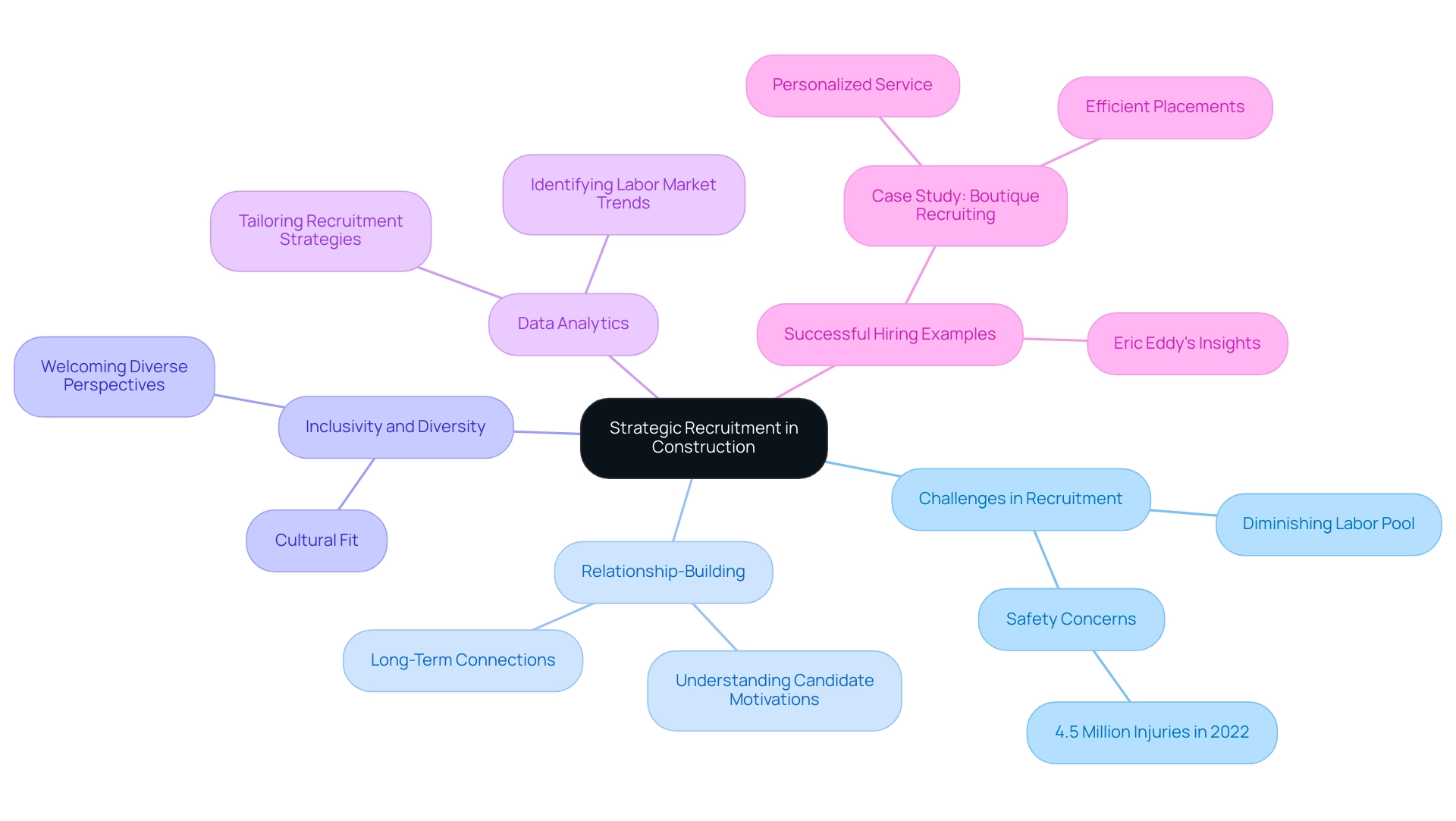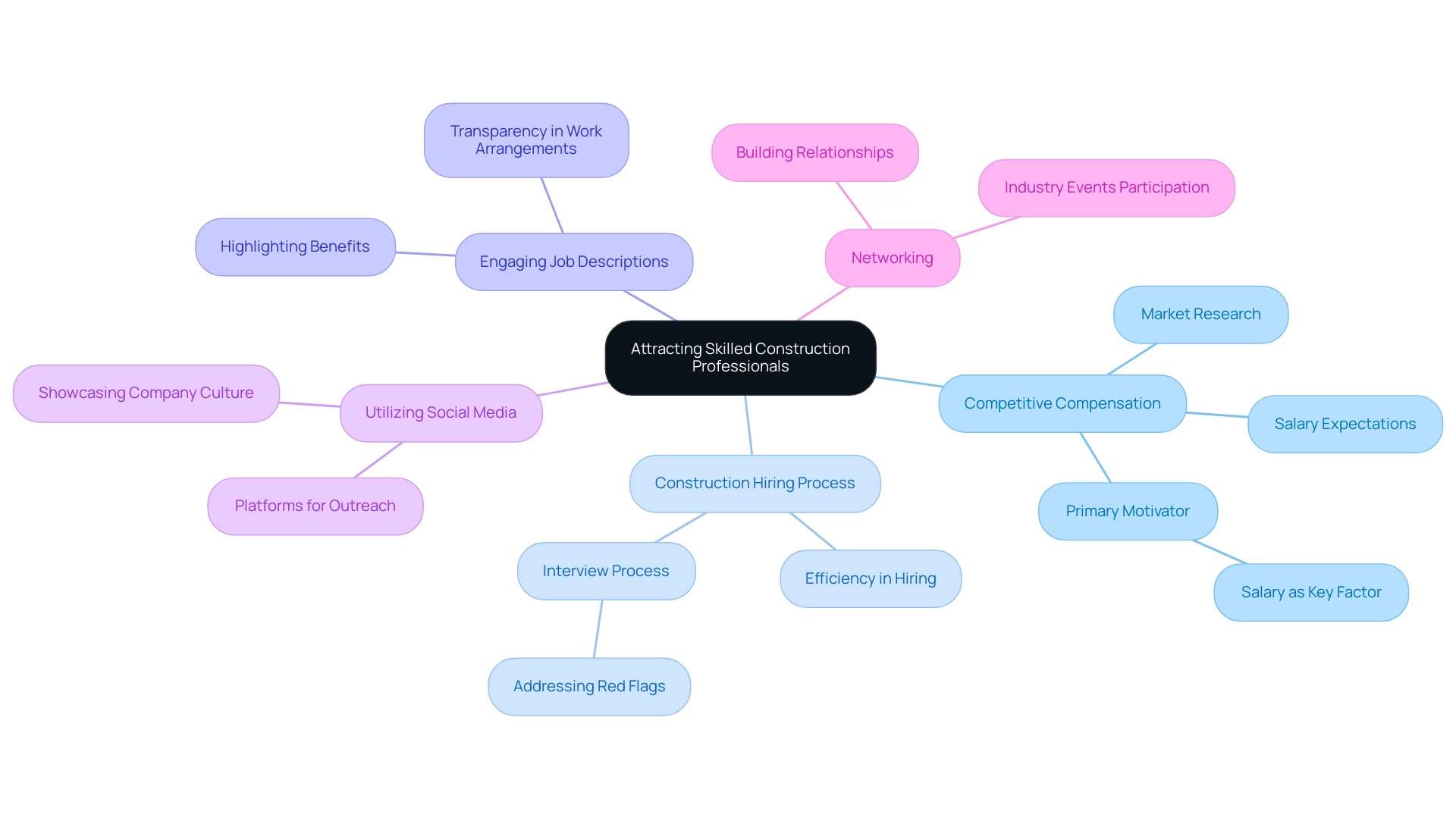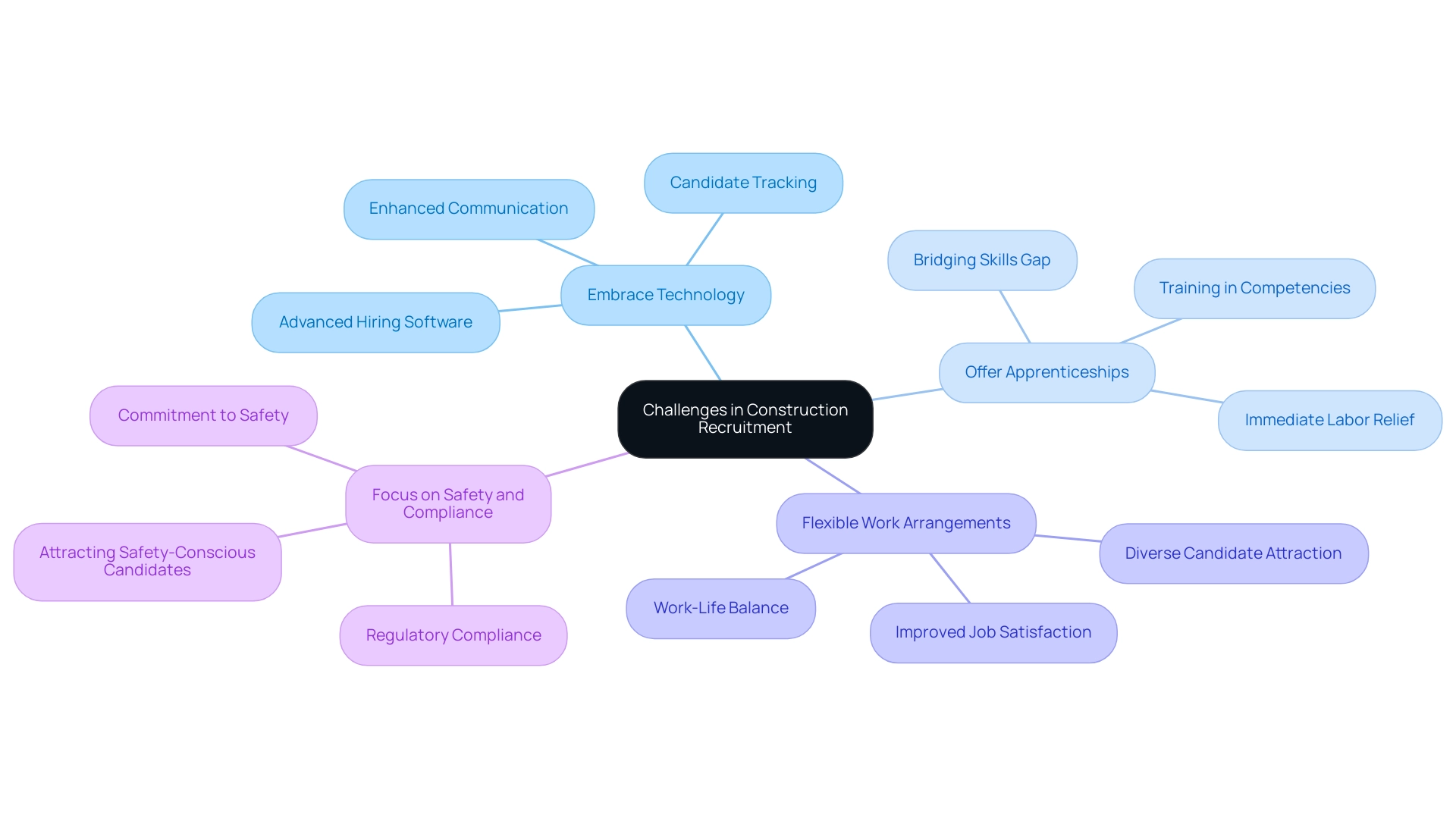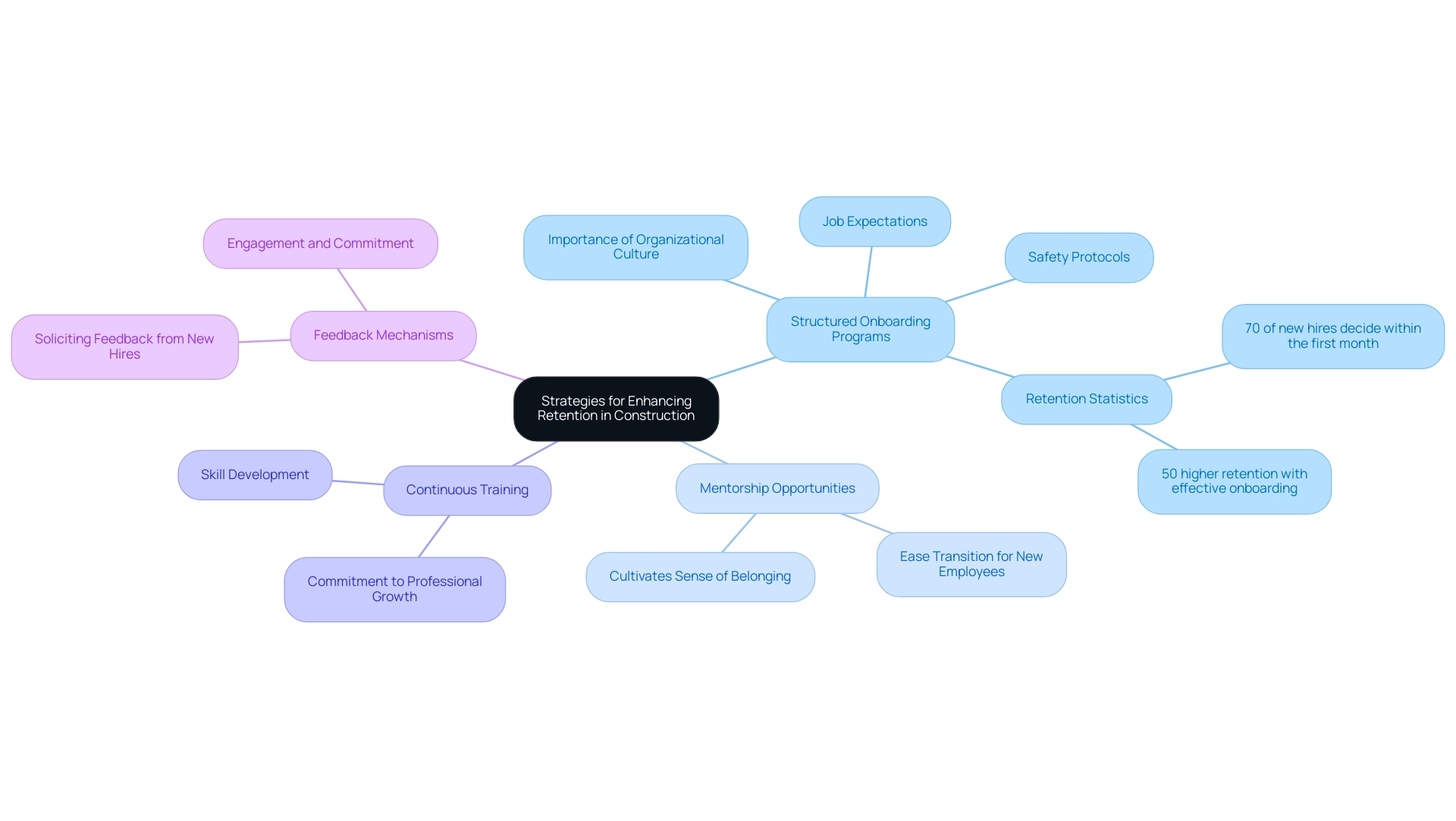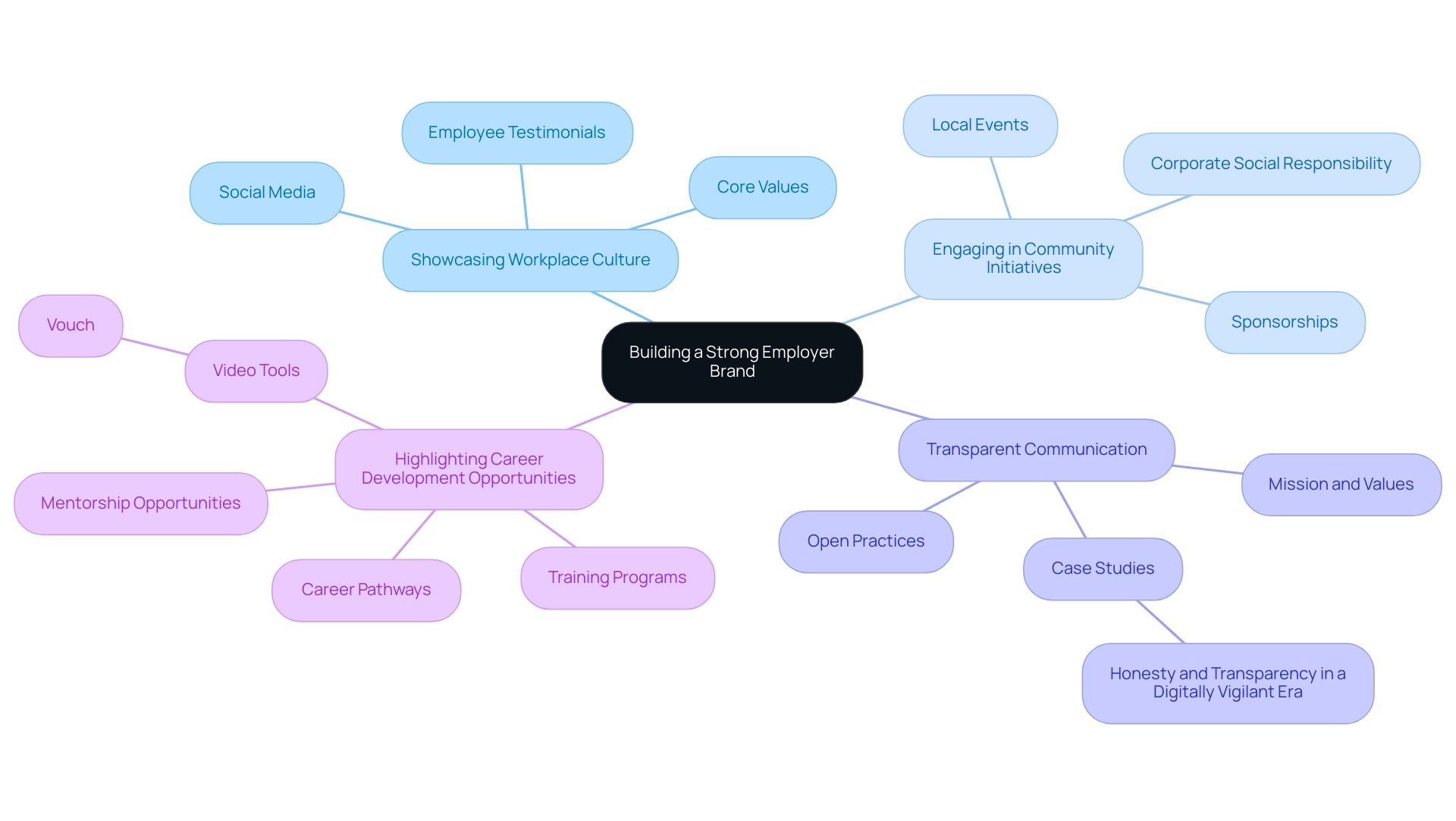Overview
The article delineates best practices for construction hiring, underscoring the significance of strategic recruitment, relationship-building, and inclusivity to effectively attract skilled professionals in a competitive market. This is supported by a detailed exploration of various strategies, including:
- Leveraging data analytics
- Offering competitive compensation
- Implementing effective onboarding processes
These approaches not only address current labor shortages but also enhance long-term employee retention. By adopting these practices, firms can position themselves as leaders in the recruitment landscape, ensuring they secure the talent necessary to thrive.
Key Highlights:
- Strategic recruitment is essential in construction due to labor shortages and the demand for specialized skills.
- Emphasizing relationship-building and understanding candidate motivations enhances hiring success.
- Data analytics is crucial for identifying labor market trends and tailoring recruitment strategies.
- A focus on inclusivity and diversity broadens the talent pool and fosters long-term success.
- Competitive compensation is vital, as salary remains a primary motivator for construction professionals.
- A swift hiring process is necessary to secure top talent in a competitive market.
- Engaging job descriptions that highlight professional growth opportunities attract more applicants.
- Utilizing social media and networking can significantly enhance outreach to potential candidates.
- Apprenticeship programs can help bridge the skills gap and address labor shortages.
- Offering flexible work arrangements is increasingly important to attract younger candidates.
- Strong onboarding and continuous training programs improve retention rates and employee satisfaction.
- Building a robust employer brand through transparency and community engagement attracts high-caliber talent.
- Highlighting career development opportunities positions organizations as desirable workplaces.
Introduction
In the dynamic realm of the construction industry, attracting and retaining skilled professionals presents an increasingly intricate challenge. With a diminishing labor pool and an escalating demand for specialized expertise, companies are compelled to reevaluate their recruitment strategies to maintain a competitive edge.
This article emphasizes the critical nature of strategic recruitment, delving into innovative approaches that not only refine hiring practices but also cultivate a culture of inclusivity and safety.
By leveraging technology to enhance processes and establishing a robust employer brand, organizations will be equipped with essential tools to navigate the distinct challenges of construction recruitment, ultimately securing top talent for sustained success.
The Importance of Strategic Recruitment in Construction
Strategic construction hiring in the construction industry is crucial, particularly in light of the sector’s unique challenges, such as a diminishing labor pool and the increasing demand for specialized skills. As the sector moves into the 5th industrial revolution, companies must embrace a proactive hiring approach that highlights relationship-building with prospective employees and a thorough comprehension of their motivations. Boutique Recruiting stands out as a partner in this endeavor, committed to personalized talent acquisition solutions that foster meaningful connections and achieve client success.
We have open positions throughout the U.S. and Canada, and leveraging data analytics is essential for identifying labor market trends and tailoring recruitment strategies to meet these evolving needs. For instance, utilizing platforms specifically designed for building professionals can significantly enhance visibility and attract qualified candidates. In 2022, the construction sector faced a staggering 4.5 million medically consulted injuries, underscoring the importance of hiring skilled workers who can contribute to a safer work environment. This statistic highlights the critical need for effective hiring practices that prioritize safety and skill.
Moreover, fostering a culture of inclusivity and diversity is vital for broadening the talent pool. By creating an environment that welcomes diverse perspectives, companies can more easily identify skilled workers who align with their organizational culture. This approach not only addresses the immediate hiring needs but also contributes to long-term success by ensuring that new hires are well-integrated into the team.
Successful strategic hiring examples in 2025 highlight the effectiveness of these methods. Businesses that prioritize establishing enduring connections with applicants and comprehending their distinct abilities and ambitions are better equipped to maneuver through the competitive environment. As noted by Eric Eddy, the firm’s ability to deliver top-notch individuals quickly and efficiently is a hallmark of effective recruitment strategies, reinforcing the need for a relationship-focused approach.
Additionally, Boutique Recruiting’s case study illustrates how differentiation through personalized service and relationship-building can lead to successful outcomes in recruitment. Amanda, a dedicated recruiter at Boutique Recruiting, exemplifies this commitment by continuously expanding her applicant pool and ensuring that placements are made efficiently while meeting or exceeding organizational expectations. Her approach not only helps candidates feel calm and confident before interviews but also aligns with the firm’s mission to connect elite candidates with professional companies.
For a current list of openings, visit our job board.
In summary, the significance of strategic construction hiring in the building sector cannot be overstated. By tackling construction hiring challenges directly and applying data-driven, relationship-focused strategies, firms can secure the specialized talent necessary for success in this dynamic field. Furthermore, considering the competitive landscape, particularly in major cities for expensive building projects like New York City and San Francisco, enhances the relevance of these recruitment strategies.
Top Tips for Attracting Skilled Construction Professionals
To effectively attract skilled building professionals, companies must implement several strategic approaches:
-
Competitive Compensation: Providing salaries that align with market standards is essential. In 2025, the average salary for building professionals varies significantly based on roles and locations. Therefore, it is imperative for employers to conduct thorough research on industry benchmarks to establish competitive pay scales. This necessity is underscored by the fact that 27% of contractors express concerns about inadequate education and training in the construction sector, which can impact salary expectations. Industry leaders emphasize that salary remains the primary motivator for employees when deciding to move or stay in a job, highlighting the critical need for competitive compensation strategies.
-
Construction Hiring Process: A swift and efficient construction hiring process is vital for securing top talent in the competitive landscape, often referred to as the ‘war for talent.’ Delays can result in losing applicants to rival organizations. Thus, businesses should strive to reduce the duration from application to offer. Hiring managers must ensure that the interview process is seamless, as applicants are assessing the organization just as much as they are being assessed. This includes being aware of potential red flags during interviews and addressing them proactively.
-
Engaging Job Descriptions: Crafting job postings that not only outline responsibilities but also emphasize the benefits of working for your organization is crucial. Highlighting opportunities for professional growth, a supportive work environment, and distinctive benefits can create a substantial impact in attracting applicants. Additionally, transparency regarding work arrangements, such as hybrid or remote options, can help build trust with potential hires. Candidates should feel encouraged to express their workstyle preferences and salary expectations during the interview process.
-
Utilizing Social Media: Leveraging platforms such as LinkedIn and industry-specific job boards can enhance outreach to potential applicants. These platforms enable businesses to showcase their brand and connect with a broader audience of skilled professionals. Authentic engagement on these platforms can also reflect the company’s culture and values, attracting candidates who resonate with them.
-
Networking: Actively participating in industry events and trade shows provides opportunities to meet potential hires and foster relationships within the construction community. Establishing a network can result in referrals and endorsements, which are essential in the hiring process. Sharing personal insights and experiences during these interactions can create a deeper connection with candidates.
In addition to these strategies, companies should consider expert insights on competitive compensation. For instance, Michael Page offers a free guide to help employers create competitive job offers and navigate salary negotiations confidently. Moreover, comprehending the varied duties of laborers and assistants, as emphasized in a case study, is crucial for customizing hiring efforts efficiently. By implementing these optimal methods, organizations can improve their hiring initiatives in construction and effectively draw the talented individuals needed to succeed in the competitive building environment. Boutique Recruiting’s impressive track record of success further underscores the effectiveness of these strategies in the hiring space, particularly in sourcing high-quality talent across diverse industries.
Navigating Challenges in Construction Recruitment
The construction sector is currently grappling with significant hiring challenges, primarily driven by labor shortages and the demand for specialized skills. To effectively tackle these issues and secure top talent, companies should implement the following strategies, with Boutique Recruiting as your partner in navigating these challenges:
-
Embrace Technology: Utilizing advanced hiring software can significantly streamline the staffing process. This technology not only enhances candidate tracking but also facilitates better communication between recruiters and applicants, ultimately leading to quicker and more efficient placements. Boutique Recruiting ensures that your recruitment process is equipped with the latest tools to attract top talent.
-
Offer Apprenticeships: Establishing apprenticeship programs is a proactive approach to cultivating a new generation of skilled workers. These programs not only help bridge the skills gap but also provide immediate relief from labor shortages by training individuals in the specific competencies required in the construction sector. Boutique Recruiting can assist in identifying and implementing effective apprenticeship strategies tailored to your needs.
-
Flexible Work Arrangements: In 2025, attracting a diverse range of candidates necessitates offering flexible work schedules. Younger workers, in particular, prioritize work-life balance, making it essential for companies to adapt their policies to meet these expectations. This flexibility can improve job satisfaction and retention rates, and Boutique Recruiting highlights this candidate-centric approach in its hiring strategies.
-
Focus on Safety and Compliance: A strong commitment to safety and regulatory compliance is crucial in the building sector. By emphasizing these values in recruitment efforts, companies can appeal to candidates who prioritize workplace safety, thereby enhancing their attractiveness as employers. Boutique Recruiting understands the importance of these factors in attracting top talent.
Additionally, Boutique Recruiting has open positions available across the U.S. and Canada, which can be found on our job board. The building industry is also witnessing a notable shift due to government investments, particularly following the Infrastructure Investment and Jobs Act (IIJA). This legislation has spurred increased spending in manufacturing development and infrastructure projects, creating a favorable environment for firms to expand their project portfolios.
As Kruttika Dwivedi, a research manager at Deloitte, emphasizes, “Adapting to evolving economic and regulatory factors is essential for engineering and construction firms to capitalize on growth opportunities in 2025.” This underscores the significance of aligning hiring strategies with the current market dynamics.
Moreover, the integration of technology in the hiring process is becoming increasingly vital. Statistics indicate that successful technology adoption can lead to enhanced hiring results, as firms that utilize innovative solutions are better positioned to navigate the current labor shortages. By applying these strategies, with Boutique Recruiting’s expertise, firms in the building sector can not only overcome challenges in construction hiring but also flourish in a competitive environment.
Additionally, firms can look to the case study titled “Government Investment and Infrastructure Development” as a real-world example of how to capitalize on government investments to enhance their recruitment strategies.
Enhancing Retention Through Effective Onboarding and Training
To significantly improve retention rates within the construction industry, organizations must prioritize construction hiring by implementing comprehensive onboarding and training programs. Effective strategies include:
-
Structured Onboarding Programs: Establish a standardized onboarding process that thoroughly introduces new hires to the organizational culture, safety protocols, and specific job expectations.
This foundational step is crucial, as research indicates that 70% of new hires determine if a job is the right fit within their first month. Moreover, organizations that implement effective construction hiring practices with onboarding that encourages team building have 50% higher retention rates, highlighting the importance of a well-structured onboarding process.
-
Mentorship Opportunities: Pairing new employees with seasoned mentors not only eases their transition but also cultivates a sense of belonging and support. Mentorship has been shown to enhance retention, as employees who feel connected are more likely to stay with the organization.
-
Continuous Training: Providing ongoing training opportunities not only sharpens employee skills but also signals a commitment to their professional growth. This investment in construction hiring can lead to higher job satisfaction and loyalty.
-
Feedback Mechanisms: Regularly soliciting feedback from new hires regarding their onboarding experience is essential for identifying areas for improvement. Employees who perceive their input as valued are more likely to feel engaged and committed to the organization.
Incorporating these strategies can lead to a more satisfied workforce, as employees report a 3.5 times better onboarding experience when their managers are actively involved. Furthermore, organizations with formal onboarding processes experience a 50% higher retention rate, underscoring the critical role of effective onboarding in fostering long-term employee satisfaction and loyalty. Additionally, considering the average cost of onboarding at $1,830 per employee, investing in these strategies not only enhances retention but also proves to be financially beneficial for organizations.
Building a Strong Employer Brand to Attract Top Talent
Establishing a robust employer brand is crucial for attracting high-caliber talent in the construction industry. Companies can significantly enhance their employer brand through several strategic approaches:
-
Showcasing Workplace Culture: Leverage social media platforms and organizational websites to effectively highlight your workplace culture, core values, and authentic employee testimonials. This clarity not only educates prospective applicants about the work atmosphere but also fosters trust. Job seekers increasingly depend on platforms like LinkedIn and Glassdoor to evaluate organizational culture. In fact, 61% of staff indicated they would leave their current employer for one with a better brand, underscoring the importance of a strong employer brand.
-
Engaging in Community Initiatives: Actively participate in local events and sponsorships to demonstrate your commitment to the community. Such involvement not only enhances your reputation as an employer but also resonates with individuals who value corporate social responsibility. Successful organizations view employer branding as a dynamic journey that adapts to workforce aspirations while maintaining authentic values.
-
Transparent Communication: Clearly express your organization’s mission, vision, and values to potential applicants. This alignment is essential, as candidates are more likely to be attracted to organizations whose goals resonate with their personal aspirations. In a digitally vigilant era, where employees prioritize transparency, organizations that openly share their practices foster loyalty and create a sense of belonging. A relevant case study titled “Honesty and Transparency in a Digitally Vigilant Era” illustrates how organizations that embrace transparency enhance their employer brand and build trust.
-
Highlighting Career Development Opportunities: Promote clear pathways for advancement within your organization. Candidates pursuing long-term career advancement are attracted to organizations that invest in their employees’ professional development. By showcasing training programs, mentorship opportunities, and potential career trajectories, you can position your company as a desirable workplace for ambitious talent. Incorporating modern strategies, such as utilizing video tools, can further enhance your employer branding efforts. As Gary Zurnamer, Co-Founder and CEO of Vouch, notes, tools like Vouch make leveraging video in your business remarkably easy.
By implementing these strategies, construction firms can enhance their hiring process to build a compelling employer brand that not only attracts top talent but also cultivates a positive organizational culture, ultimately leading to enhanced employee satisfaction and retention.
Conclusion
In the dynamic landscape of the construction industry, strategic recruitment has become an indispensable necessity for organizations striving to attract and retain top talent. The dual challenges of a diminishing labor pool and the escalating demand for specialized skills compel companies to embrace innovative, relationship-driven recruitment strategies. By leveraging technology and harnessing data analytics, firms can refine their hiring processes to enhance visibility and cultivate a safer, more inclusive workplace.
The significance of competitive compensation paired with an efficient hiring process cannot be overstated. Candidates are increasingly drawn to organizations that not only provide fair salaries but also ensure a swift and streamlined recruitment experience. Engaging job descriptions and a robust social media presence further amplify outreach efforts, enabling organizations to connect with skilled professionals effectively.
Furthermore, addressing recruitment challenges through apprenticeship programs and flexible work arrangements is vital for nurturing a diverse talent pool. Prioritizing safety and compliance in recruitment efforts resonates with candidates who value workplace security, thereby enhancing the attractiveness of potential employers.
Ultimately, establishing a robust employer brand is crucial for long-term success within the construction sector. Companies that effectively showcase their culture, engage in community initiatives, and promote career development opportunities will undoubtedly attract top talent. By implementing these strategic approaches, organizations can not only navigate recruitment challenges but also foster a positive work environment that encourages retention and professional growth, solidifying their position in a competitive landscape.
Frequently Asked Questions
Why is strategic hiring important in the construction industry?
Strategic hiring is crucial in the construction industry due to challenges like a diminishing labor pool and increasing demand for specialized skills. It helps companies secure the talent necessary for success, especially as the sector evolves into the 5th industrial revolution.
What role does Boutique Recruiting play in construction hiring?
Boutique Recruiting offers personalized talent acquisition solutions that focus on building meaningful connections with prospective employees and understanding their motivations, ultimately leading to successful recruitment outcomes.
How can data analytics improve recruitment strategies in construction?
Leveraging data analytics helps identify labor market trends and tailor recruitment strategies to meet evolving needs, enhancing visibility and attracting qualified candidates through platforms designed for building professionals.
What were some significant safety concerns in the construction sector in 2022?
In 2022, the construction sector faced 4.5 million medically consulted injuries, highlighting the importance of hiring skilled workers to contribute to a safer work environment.
How does fostering a culture of inclusivity and diversity benefit hiring?
Creating an inclusive and diverse environment broadens the talent pool and helps identify skilled workers who align with the organizational culture, contributing to both immediate hiring needs and long-term success.
What are some successful hiring strategies observed in 2025?
Successful hiring strategies in 2025 include building enduring connections with applicants and understanding their unique abilities and ambitions, which help companies navigate the competitive hiring landscape effectively.
What is the significance of competitive compensation in construction hiring?
Competitive compensation is vital as it aligns salaries with market standards, helping to attract and retain talent. Salary remains a primary motivator for employees when deciding to move or stay in a job.
Why is an efficient hiring process important in the construction industry?
A swift and efficient hiring process is essential to secure top talent and avoid losing applicants to competitors. Reducing delays from application to offer is crucial in the competitive landscape.
What should engaging job descriptions include?
Engaging job descriptions should outline responsibilities while emphasizing benefits like professional growth opportunities, a supportive work environment, and transparency about work arrangements.
How can social media be used effectively in recruitment?
Utilizing platforms like LinkedIn and industry-specific job boards enhances outreach by showcasing the company brand and culture, attracting candidates who resonate with the organization’s values.
What is the importance of networking in construction hiring?
Networking at industry events and trade shows allows companies to meet potential hires, foster relationships, and gain referrals and endorsements, which are crucial in the hiring process.
